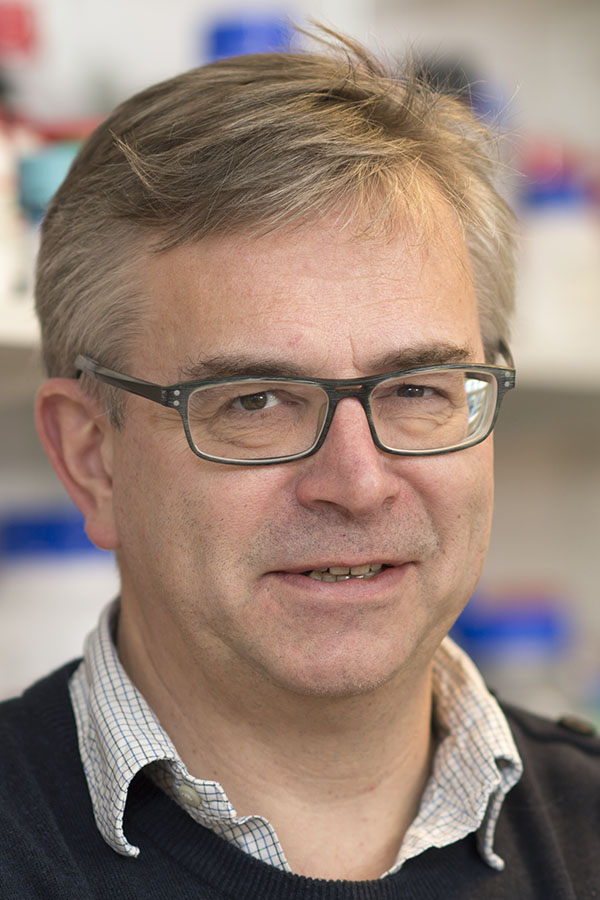Lecture: 'Manipulating mitochondrial ROS and oxidative damage as therapeutic strategies'

Prof. Mike Murphy (Mitochondrial Biology Unit, University of Cambridge)
CiQUS Seminar Room
12:15h
Reactive oxygen species (R OS) produced by mitochondria cause oxidative damage that impairs the ability of mitochondria to make ATP and to carry out their metabolic functions. They may participate also in cellular redox signalling pathways. One important aspect of our work is to investigate how oxidative damage to mitochondria contributes to human pathologies. We have worked out a way of targeting small bioactive molecules, such as antioxidants, to mitochondria in order to counter the effects of ROS and to examine the effects of doing so at cellular and whole animal levels. The bioactive molecule is attached chemically to a lipophilic cation such triphenylphosphonium. These cations accumulate selectively, first in the cytosol, driven by the plasma membrane potential, and then several-hundred fold in the matrix of mitochondria, driven by the membrane potential across the inner membrane. A second important aspect is to determine whether and how mitochondrial ROS alters the activities of proteins in putative signalling and protective pathways by reversibly modifying the redox state of critical protein thiols in mitochondria. We use a range of free radical and proteomic approaches to identify the proteins involved, and to identify the cysteine residues and any redox modifications. Finally, we take this information and use it to rationally design potential therapies for diseases that arise from mitochondria dysfunction. Currently our main focus for therapy is the ischaemia/reperfusion injury that arises from stroke and heart attack.
OS) produced by mitochondria cause oxidative damage that impairs the ability of mitochondria to make ATP and to carry out their metabolic functions. They may participate also in cellular redox signalling pathways. One important aspect of our work is to investigate how oxidative damage to mitochondria contributes to human pathologies. We have worked out a way of targeting small bioactive molecules, such as antioxidants, to mitochondria in order to counter the effects of ROS and to examine the effects of doing so at cellular and whole animal levels. The bioactive molecule is attached chemically to a lipophilic cation such triphenylphosphonium. These cations accumulate selectively, first in the cytosol, driven by the plasma membrane potential, and then several-hundred fold in the matrix of mitochondria, driven by the membrane potential across the inner membrane. A second important aspect is to determine whether and how mitochondrial ROS alters the activities of proteins in putative signalling and protective pathways by reversibly modifying the redox state of critical protein thiols in mitochondria. We use a range of free radical and proteomic approaches to identify the proteins involved, and to identify the cysteine residues and any redox modifications. Finally, we take this information and use it to rationally design potential therapies for diseases that arise from mitochondria dysfunction. Currently our main focus for therapy is the ischaemia/reperfusion injury that arises from stroke and heart attack.
About
Since 2001, Mike Murphy is Programme Leader at the MRC Mitochondrial Biology Unit of the University of Cambridge. After receiving his PhD in 1987 there, he worked in different institutions, both as a researcher and as a teacher, such as the Columbia University College of Physicians and Surgeons (New York) and the Trinity College of the University of Dublin. From 2000 and 2001, he moved to the Otago School of Medical Sciences as Dean for Research.
Professor Murphy has been awarded with the Applied Biosystems Medal of the New Zealand Society of Biochemistry and Molecular Biology, the Research Medal of the New Zealand Association of Scientists and Keilin Memorial Lecture and Medal, among others. He has also been named Honorary Fellow of the Departments of Chemistry and Biochemistry of the University of Otago and Honorary Fellow of the Royal Society of New Zealand (Hon FRSNZ).
He has more than 150 scientific publications and is part of several editorial boards such as Biochemical Journal, Free Radical Biology and Medicine Journal, FEBS Journal, Redox Biology, Redox Report, Free Radical Research and Antipodean Pharmaceuticals journal.


